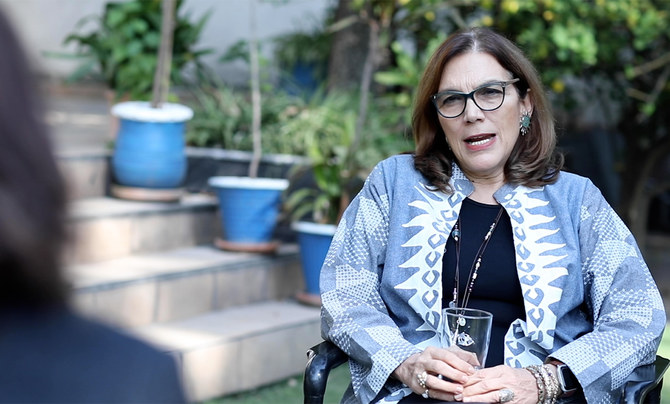ISLAMABAD: The European Union’s ambassador to Islamabad, Androulla Kaminara, has said the EU will continue to be Pakistan’s “steady partner” in supporting Afghan refugees amid increasing worries that Afghanistan’s collapsing economy could push fresh flows of asylum seekers to its neighbors.
Afghanistan plunged into economic crisis when its Western-backed administration collapsed in mid-August as the Taliban took control. The takeover triggered the suspension of billions of dollars in international assistance to the country’s aid-dependent economy.
As it is sinking deeper into economic crisis, with the international community facing a tough decision of how it should reach the Afghan people without recognizing the Taliban, neighboring countries such as Pakistan have been worried about a mass movement of refugees.
Pakistan has hosted millions of Afghan refugees from decades of conflict. While 1.4 million Afghans are officially registered by Pakistani authorities, the government estimates the actual number of refugees to be even 3.5 million.
“Pakistan has been very, very generous in hosting large number of refugees for many decades,” Kaminara told Arab News in an exclusive interview on Friday.
“I think we have been a very steady partner of Pakistan in trying to support the plight of the Afghan refugees and we will continue to play that role,” she said, as she outlined the EU’s aid efforts.
“We have a situation where there was a consistent humanitarian crisis which has almost doubled in intensity. So, first we have been providing aid at the beginning of the year we had announced 57 million euros of humanitarian aid to Afghanistan. We have recently made the number six times greater, it has gone up to 300 million,” Kaminara said, adding that EU assistance has also been directed at Afghan refugees in Pakistan.
“Over 30 million euros have been put in the past in to supporting Afghans in Pakistan, and also I have to underline where we help Afghan refugees, we also help Pakistani host communities.”
As the EU will undertake in February a periodic review of its preferential trade arrangement with Pakistan, the ambassador expressed concerns over human rights challenges in the South Asian nation.
Citing violence and discrimination against religious minorities, the European Parliament moved a resolution in April seeking an immediate appraisal of Pakistan’s eligibility for the trade facility — Generalized Scheme of Preferences Plus (GSP+).
GSP+ is a special trade arrangement offered to developing economies by European nations in return for their commitment to uphold and implement 27 international conventions on human rights, environmental protection and governance. Pakistan is said to be the largest beneficiary of the scheme that allows it to export its products to the European market on zero percent duty.
“GSP+ regulation basically says that we have to do periodic reviews of the progress of each country every two years. Currently, we are in the process of preparing the next report,” Kaminara said. “Whether or not that trade regime continues to be granted depends on the progress and depends on the result of this report which is being drafted.”
She added that the EU’s “list of areas of concerns have not changed” since the previous report was published in February 2020.
The EU envoy welcomed, however, Pakistan’s efforts to mitigate the effects of climate change.
“We are very pleased that Pakistan has given climate change mediation such a priority and we have often congratulate Pakistan for the progress made,” Kaminara said. “Pakistan is in a pretty unique position because although it contributes very small share in CO2 emission globally but it’s one of the most vulnerable countries to climate change impact.”
She added that the EU has been partnering with Pakistan in some of its renewable energy projects and has been contributing 18 million euros a year in development grants: “A lot of that funding is going into environmentally friendly projects and programs in order to further support Pakistan in this endeavor.”












